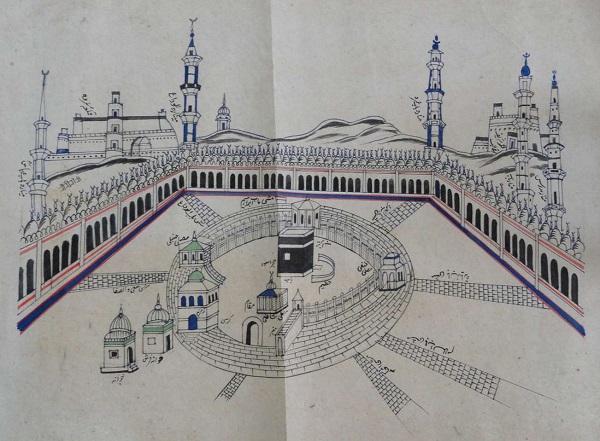FWP:
SETS == HI
ISLAMIC: {10,2}
WINE: {49,1}
In the first line, the speaker initially addresses the companions with whom he is making the Haj pilgrimage, and unceremoniously sends them on without him. He tells them to leave him zamzam hii pah -- either 'only' (which would imply that he has no intention of doing more of the pilgrimage rituals) or 'emphatically' (which would leave open the question of his future plans) at Zamzam, the sacred well near the Ka'bah.
Then in the second clause, the speaker impatiently brushes off the very idea of his joining his companions in the ritual circumambulation of the Ka'bah: the idiomatic expression mujhe us se kyaa has the literal form of 'to me from that, what?'. Depending on tone and context, the range of meanings can extend from a rejection of desire ('What would I want with that?') to a rejection either of usefulness ('What would I get out of that?'), or even of relevance at all ('What do I have to do with that?').
Then the second line is a straightforward, neutral-looking assertion-- but a titillating, even shocking, one. The special white pilgrimage robe worn by pilgrims to Mecca is to be kept, like the pilgrim himself, in a particularly high state of purity. For one's robe to be stained with a forbidden substance like wine, and that too right in the precincts of the Ka'bah itself, is in ritual terms extremely unacceptable.
On any possible reading, the verse is a quintessentially 'rakish' [rindaanah] one, because the speaker has obviously been drinking heavily during his pilgrimage: either he's so drunk he didn't even notice the wine-spots on his white pilgrimage robe until he reached Zamzam, or else, even more radically, he's been doing his drinking right there by Zamzam itself. Is he even sorry about this shocking behavior? Perhaps, but not necessarily. On some readings he treats it as a petty and practical problem, like a spilled drink at a party; on other readings, he's not sorry at all. Here are some of the possibilities:
='It would be useless for me to continue the pilgrimage, since my pilgrimage robe has been stained with wine; I might as well just sit here by Zamzam instead' (2a). (Spoken resignedly? guiltily? abashedly? vexedly? indifferently?)
='Before continuing the pilgrimage, I need to wash off, in the water of Zamzam, the wine-stains from my pilgrimage robe' (2a). (Spoken ruefully? apologetically? resentfully? matter-of-factly?)
='It's so enjoyable just sitting here and drinking, in the pleasant vicinity of Zamzam; and the wine is so overflowing, it's even spilled on my robe. I think I'll just stay here and keep on drinking' (2b).
='This 'water' of Zamzam is powerful stuff-- it transports me like wine! I'm so intoxicated with it that my robe too has become saturated with this 'wine'; what more do I need or want from any pilgrimage than this?' (2b). (On this reading the speaker is deep into Sufistic territory.)
This verse was one of my earliest favorites. It's one more of the kind that makes Ghalib, Ghalib.
Compare the divan's other Zamzam verse, {180,4}.
Compare this equally brilliant and rakish verse by Mir: M{7,7}.
In this anonymous drawing, the well of Zamzam is in the building with three blue windows and a blue door (click on the image for a large scan):

Nazm:
For goodness sake [bhalaa]-- would I make a circumambulation, or would I sit and wash out the stains of wine? (263)
== Nazm page 263